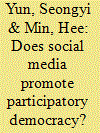| Srl | Item |
| 1 |
ID:
175527


|
|
|
|
|
| Summary/Abstract |
This study examines whether social media contributed to the success of the Korean presidential impeachment protests of 2016–17 and promoted participatory democracy. The 2016–17 candlelight protests contributed to the overthrowing of a corrupt regime. However, was it a victory of participatory democracy? To answer this question, we must first be clear on what kind of participatory democracy is being referred to. Therefore, while social media played a crucial role in the success of the protests, the impact of social media on participatory democracy should be addressed separately. For this purpose, we first analyse the contributions of the digitally connected movements during the 2016–17 protests with two social movement theories: resource mobilisation and collective identity. Second, we examine whether the success of digitally connective movements during those protests promoted participatory democracy. To discuss this issue, we use Arnstein’s concept of a ‘ladder of participation’, which describes participatory democracy as falling within three levels, from non-participation through tokenism to citizen power. This study shows that the proliferation of social media politics by itself does not convert representative democracy into participatory democracy. This implies that even if social media augments citizens’ power of resistance, it cannot transform citizens into a governing power.
|
|
|
|
|
|
|
|
|
|
|
|
|
|
|
|
| 2 |
ID:
167391


|
|
|
|
|
| Summary/Abstract |
This study examines the preparation and implementation of the District Medium Term Development Plans in four sub-district structures in the East Gonja District to ascertain the veracity or otherwise of the planning process as established by laws and regulations. Using qualitative approaches of focus group discussions, interviews and documentary analysis the study reveals that the process of development planning was not participatory and was short-circuited. This therefore renders the District Medium Term Development Plans ineffective and less responsive to the needs of the people and/or the communities in the district. Also, the sub-district structures, though operational, were ineffective as a result of low revenue generated from the low-economic activities in the district coupled with the delay of the release of and the inadequacy of the District Assemblies Common Funds (DACF). No doubt, the challenge of resource constraint for effective planning is evident. There is therefore the need for a deliberate policy strategy towards establishing an insulated fund to support development planning at the district level.
|
|
|
|
|
|
|
|
|
|
|
|
|
|
|
|